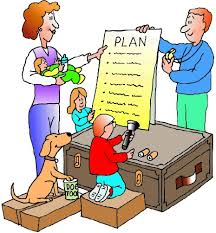 Develop a Family Emergency Plan
Develop a Family Emergency Plan
Emergency planning can help to ensure an effective response to emergencies and disasters. Have a family meeting to discuss potential emergency situations. Talk about what each family member should do in different situations.
Develop your plan based on an assessment of the kinds of emergencies that can occur in your community. Natural events can include winter storms, floods or tornados. Secondary events, such as toxic spills can exacerbate a weather-related event and prolong a state of emergency. While the emergency incident may vary, the elements of an effective response are the same.
Ensure elderly family members, who may not live with you, are included in your emergency plans.
Conduct a hazard audit of your home. Review fire safety features such as smoke and carbon monoxide detectors and how to monitor them. Check for frayed electrical cords or overloaded circuits. Don't keep flammable materials near electrical equipment or your furnace. Learn how to safely turn off main water and electrical switches in your home. Locate the safe areas in your home in case of a tornado (i.e. interior bathrooms, closets, lowest floor level).
Select a predetermined meeting place if a fire or other event forces your family out of your home. Ask someone outside your immediate area to act as a central point of contact for your family members, relatives and friends in an emergency.
| How to get Started |
|
Meet your neighbors. Plan how the neighborhood could work together after a disaster. Know your neighbor's skills (medical, technical). Consider how you could help neighbors who have special needs, such as elderly or disabled persons. Make plans for child care in case parents can't get home. |
| Practice and maintain your plan |
|
Disasters happen anytime and anywhere, and when disaster strikes, you may not have much time to respond. A highway spill of hazardous material could mean instant evacuation. A winter storm could confine your family at home. An earthquake, flood, tornado or any other disaster could cut off basic services (gas, water, electricity and telephone) for days. |
| Supplies |
|
Basics you should stock in your home include water, food, first aid supplies, clothing, bedding, tools and emergency supplies. Keep the items that you would most likely need during an evacuation in an easy to carry container - a large, covered trash container, a camping backpack or a duffel bag. Make sure to have a one (1) week supply of any and all medications. |


